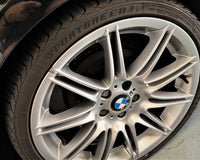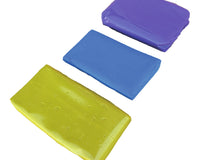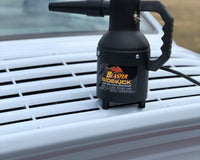Washing a car might seem like a straightforward task, but the quality of water used plays a significant role in the outcome. Hard water, prevalent in many regions, can pose substantial challenges during car washing, often leading to unsatisfactory results and long-term damage to the vehicle’s paintwork. Understanding the impact of hard water and learning how to mitigate its effects is crucial for achieving a spotless, professional finish.
What Is Hard Water and Why Is It a Problem?
Hard water is water that contains high levels of dissolved minerals, primarily calcium and magnesium. These minerals accumulate in water as it travels through underground rocks and soil. While not harmful to human health, hard water can wreak havoc on a car’s surface when used for washing.
The problem arises when hard water dries on the car’s surface, leaving behind unsightly water spots and mineral deposits. These deposits, if left untreated, can etch into the paint and create permanent blemishes. Additionally, hard water reduces the effectiveness of car shampoos and cleaning agents, making it harder to achieve a clean, streak-free finish.
How Hard Water Affects the Washing Process
Hard water impacts various aspects of the car washing process, from the initial rinse to the final drying step.
Reduced Detergent Effectiveness
The minerals in hard water react with the surfactants in car shampoos, reducing their ability to create foam and break down dirt. This reaction results in less effective cleaning and leaves behind residues that dull the car’s shine.
Stubborn Water Spots
When hard water evaporates, the dissolved minerals are left behind as white, chalky spots. These spots are not just an aesthetic issue—they can bond with the clear coat over time, making them difficult to remove without abrasive methods.
Damage to Paint and Trim
The mineral deposits from hard water can etch into the clear coat, causing micro-abrasions that compromise the paint’s integrity. Over time, these deposits can lead to discolouration and make the paint more susceptible to further damage.
How to Identify Hard Water Damage
Recognising hard water damage early can help prevent long-term issues. Some common signs include:
- Persistent water spots that do not wash away easily.
- A rough texture on the paint’s surface when touched.
- Fading or dulling of the car’s paintwork.
- Cloudy or streaky windows and mirrors after washing.
Mitigating the Effects of Hard Water
Although hard water poses challenges, there are several effective strategies to mitigate its impact during car washing.
Using a Water Softener System
A water softener is one of the most effective ways to combat hard water. These systems work by removing calcium and magnesium ions from the water, replacing them with sodium or potassium ions. Installing a water softener at your home ensures that you have access to soft water for washing your car and other household tasks.
Utilising Spot-Free Rinse Systems
Spot-free rinse systems use deionised (DI) water to eliminate minerals completely. DI water is highly purified and leaves no residue when it dries, ensuring a streak-free finish. Many professional car washes use this technology, but portable DI systems are also available for home use.
Adding a Water Softening Solution
If installing a full water softener isn’t feasible, you can use water softening solutions or shampoos specifically designed for hard water. These products contain chelating agents that bind to minerals, preventing them from depositing on the car’s surface.
Techniques to Minimise Hard Water Damage
In addition to using softened or deionised water, adopting proper washing and drying techniques can further minimise hard water damage.
Wash in Small Sections
Washing the car in small sections ensures that water does not dry on the surface before you can rinse and dry it. This is particularly important in hot or windy weather, which accelerates evaporation.

Dry the Car Immediately
Using a high-quality microfiber towel or a car dryer to remove water immediately after rinsing prevents mineral deposits from forming. Avoid air-drying, as it allows hard water to evaporate and leave behind spots.
Rinse Thoroughly
A thorough rinse is essential to remove any residual soap or minerals from the car’s surface. Use a steady stream of water, and make sure to rinse from the top down to prevent dirt and minerals from running onto already-cleaned areas.
Preventive Measures for Hard Water Spots
Taking preventive measures can save you the hassle of dealing with hard water spots and the potential damage they cause.
Apply a Wax or Sealant
A layer of wax or paint sealant provides a protective barrier between the car’s surface and mineral deposits. These products make it easier to wash off hard water spots and prevent them from bonding with the paint.
Use a Quick Detailer Spray
Quick detailer sprays can be used after washing to remove any residual spots and enhance the car’s shine. Look for sprays that are specifically designed to tackle hard water spots.
Invest in Ceramic Coating
For long-term protection, consider applying a ceramic coating to your car. Ceramic coatings offer a durable, hydrophobic layer that repels water and prevents mineral deposits from adhering to the paint.
Repairing Hard Water Damage
If hard water spots or etching have already occurred, professional intervention or DIY remedies can restore the car’s finish.
Clay Bar Treatment
A clay bar can be used to remove surface-level mineral deposits and contaminants. This treatment is particularly effective for water spots that have not yet bonded with the paint.
Polishing the Paint
For more stubborn spots or light etching, polishing the affected areas with a dual-action polisher and a fine abrasive compound can restore the paint’s smoothness and shine.
Specialised Water Spot Removers
Many car care brands offer water spot removers specifically formulated to dissolve mineral deposits without damaging the paint. These products are ideal for treating isolated spots or patches.
Conclusion
Hard water can be a persistent challenge for car owners, but understanding its impact and implementing effective strategies can help maintain your vehicle's pristine appearance. Whether by using softened or deionised water, applying protective coatings, or adopting proper washing techniques, you can minimise the effects of hard water and ensure your car stays spotless. By investing in the right tools and products, car enthusiasts can enjoy professional-quality results without the frustration of water spots and damage.




